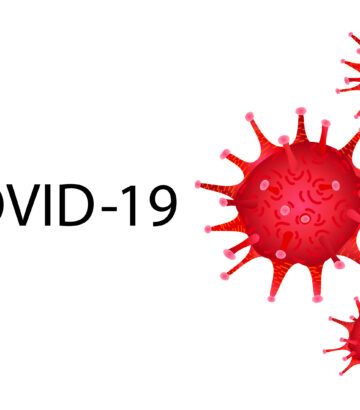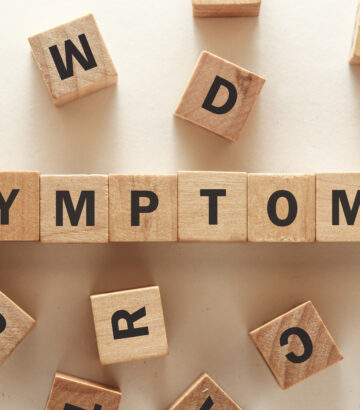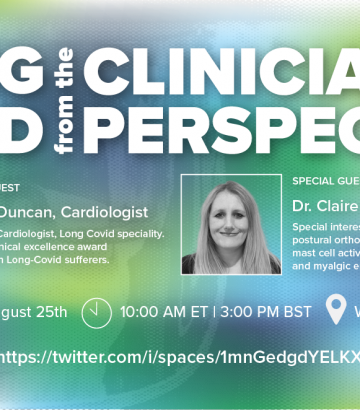Resources for Those Who Have Long COVID
How do I know if I have long COVID?
Many people have symptoms that change their lives after seemingly recovering from a case of COVID, even if they don’t know they had COVID—because asymptomatic or very mild cases can also be followed by these symptoms. The symptoms of long COVID may include any of the following: severe tiredness, shortness of breath, worsening of symptoms after activities, memory problems, “brain fog”, heart palpitations, chest pain, headaches, mood and sleep disturbances, muscle weakness, loss or change of smell and taste, and many others.
If I have one or more of these symptoms, what should I do?
If your symptoms seem severe you should seek medical help without delay. Some of these symptoms can be life threatening and should be checked. If the symptoms seem less severe you should still contact your physician for advice. But there are a lot of people who need help now, and health care providers will not be in a position to meet all needs. Please read on, here you may find others who are experiencing similar symptoms and share what they have learned. We will provide information that may be helpful in clarifying your situation and what to expect. Since new discoveries about COVID are being made frequently, it is useful to stay up-to-date.
Here are some resources for individuals concerned about long COVID, for themselves or others, to find supportive communities and navigate the uncertainty that unfortunately surrounds long COVID. Long COVID still escapes full recognition by society and many medical organizations. Fortunately, this situation is changing and the importance of long COVID is being recognized. Advocacy groups and specialist clinics offer help to those who need more information or are suffering from long COVID.
Where to find others who have long COVID and long COVID organizations/advocacy groups:
There are international and local support groups for people with long COVID in many countries, on Facebook or other social media. Below is a partial list. Please do not hesitate to contact us if you have trouble finding a physician or if you know of a group that we should add here (contact form below).
International:
- Long Covid Kids
- Long Covid Support
- Long Covid Support Group on Facebook
- Body Politic
- The COVID-19 Longhauler Advocacy Project
- Kindred Hugo Health. Making our lives better together
Europe:
- Europe: Long-Covid Europe
- Austria: longcovidAT
- Belgium: Ookditiscovid
- Czech Republic (Czechia)/Slovakia: Long covid a postcovidový syndrom – ČESKO A SLOVENSKO
- Denmark: Covidramte med senfolger
- Finland: Koronaviruksen saaneet ja oireilevat keskusteluryhmä
- France:
- Collectif de Malades Covid 19 au Long Cours
- ApresJ20. National association, advocacy and help for patients. (@apresj20) /Twitter
- Germany: #nichtgenesen
- Iceland: Við fengum Covid19
- Italy: Long COVID Italia (@LongCovidItalia) / Twitter
- Ireland: Long COVID Ireland (@longcovidirl)
- The Netherlands:
- Long Covid Nederland
- Long COVID Nederland (PASC) (@LongCovidNL) / Twitter
- Norway: COVID-19 Norge Langtidssyke
- Poland: Koronawirus Covid-19 grupa wsparcia dla chorjacych przez dlugi czas
- Scotland: Support and resources — Long Covid Scotland
- Spain:
- Covid Persistente Espana
- LongCovidACTS
- Sweden: COVID-19, Vi som är drabbade (Facebook)
- Switzerland: Long Covid Switzerland (@LongCovidCH) / Twitter
- Russia: Нетипичный короновирус : обмен опытом (Facebook)
- UK:
- Long Covid SOS
- Long Covid Kids
- Long Covid Support (Facebook)
North America:
- Canada:
- Long Covid Canada website and Facebook
- J’ai eu la Covid-19 – Témoignages et soutien on Facebook
- COVID-19/Coronavirus Canada/World Friends
- COVID Long Haulers Support Group Canada
- US:
- Survivor Corps
- Survivor Corps on Facebook
- Long-COVID Alliance
- Body Politic
- COVID-19 Long Haulers Support
- Black Covid-19 Survivors on Facebook
- Long Covid Families
- https://www.wearebodypolitic.com/resources-for-providers – handout made by Body Politic designed for providers to give to their Long Covid patients about support groups
South America:
- Covid Persistente Argentina (@Covidpersisarg on Twitter)
- Long Covid Chile (@LongCovidChile on Twitter) and Contagiados Covid19 on Facebook
- Covid Persistente Peru (@peru_covid on Twitter)
- Brazil (on Facebook)
Oceania:
- Australia: Covid-19 Corona Survivors Australia
- New Zealand:
Asia:
- India – India-Covid Survivors Group (closed discussion group on Telegram)
- Indonesia: Covid Survivor Indonesia on Facebook
- Philippines:
- Pakistan:
Other resources:
- Gez Medinger & Danny Altmann: The Long Covid Handbook
- The Long COVID Survival Guide. How to Take Care of Yourself and What Comes Next. Stories and Advice from Twenty-one Long-Haulers and Experts
Clinical studies that may be recruiting patients with Long Covid
● Europe:
○ UK: HEAL-COVID. This national clinical trial aims to identify treatments that may be beneficial for people discharged from hospital after recovering from COVID-19. https://heal-covid.net/
● North America:
○ The LISTEN study. Yale. https://medicine.yale.edu/ycci/listen-study/ Listen to Immune, Symptom and Treatment Experiences Now. This study is recruiting via Kindred: https://www.kindred.hugo.health/research/listen-study
○ The National Institutes of Health (NIH) created the Researching COVID to Enhance Recovery (RECOVER) Initiative to learn about the long-term effects of COVID. https://www.recovercovid.org/
Websites with General Information for those with Long COVID
Language: English:
- The COVID-19 Longhauler Advocacy Project (extensive and detailed)
- Open Medicine Foundation (info related to Long COVID & ME/CFS)
- MEAction (Pacing guide for Long COVID patients with Post Exertional Malaise & those with acute Covid19)
- *Simple handout on PEM and pacing from ME action
- Bateman Horne Center (extensive & detailed info for patients & providers alike)
- RTHM (articles on Long COVID, suspected pathology, tips and tricks for coping with certain symptoms)
- LongCOVIDHQ (coming soon — repository of Long COVID research articles, podcasts, videos)
- Solve M.E. – Resources on Long COVID & ME/CFS
- C19 Recovery Awareness
- Long Covid Physio
- World Physiotherapy briefing paper on response to Covid-19- “Safe Rehabilitation Approaches for People Living with Long Covid, Physical Activity and Exercise” (translations also available at this link: Bosnian, Bulgarian, French, Indonesian, Polish, Portuguese-Brazilian, Vietnamese, Romanian, Spanish, Urdu)
- Long Covid Families
- https://longcovidfamilies.org/daily-living/ – info about energy management, work and school accommodations, mobility aids
Language: Italian: pacing management guide from ME Action
Language: Swedish: pacing management guide form ME Action
Other Languages: https://longcovid.physio/quick-access
- “What is Long Covid?” in: Albanian, Arabic, Assamese, Bahasa Malaysia, Bangla, Bosnian, Brazilian Portuguese,Bulgarian, Burmese, Catalan, Chinese – Simplified, Chinese – Traditional, Czech, Dari, Dutch Belgian, Dutch,Dzongkha, English, Estonian, Filipino, Finnish, French, German, Greek, Gujarati, Haitian Creole, Hindi, Hungarian,Igbo, Indonesian, IsiZulu, Italian, Japanese, Khmer, Korean, Latvian, Macedonian, Malagasy, Mongolian, Nepali,Norwegian, Pashto, Polish, Portuguese, Romanian, Russian, Serbian, Sinhala, Slovak, Slovenian, Spanish, Swahili,Tajik, Thai, Ukrainian, Urdu, Vietnamese and Wolof.
- “Fatigue and PEM” in: Albanian, Arabic, Assamese, Bahasa Malaysia, Bangla, Bosnian, Brazilian Portuguese,Bulgarian, Burmese, Catalan, Chinese – Simplified, Chinese – Traditional, Czech, Dari, Dutch Belgian, Dutch,Dzongkha, English, Estonian, Filipino, Finnish, French, German, Greek, Gujarati, Haitian Creole, Hindi, Hungarian,Igbo, Indonesian, IsiZulu, Italian, Japanese, Khmer, Korean, Latvian, Macedonian, Malagasy, Mongolian, Nepali,Pashto, Portuguese, Romanian, Russian, Serbian, Sinhala, Slovak, Slovenian, Spanish, Swahili, Tajik, Thai, Ukrainian,Urdu and Vietnamese.
- “How to Use Pacing” in: Albanian, Arabic, Assamese, Bahasa Malaysia, Bangla, Bosnian, Brazilian Portuguese,Bulgarian, Burmese, Catalan, Chinese – Simplified, Chinese – Traditional, Czech, Dari, Dutch Belgian, Dutch,Dzongkha, English, Estonian, Filipino, Finnish, French, German, Greek, Gujarati, Haitian Creole, Hindi, Hungarian,Indonesian, IsiZulu, Italian, Japanese, Khmer, Korean, Latvian, Macedonian, Malagasy, Mongolian, Nepali, Pashto,Polish, Portuguese, Romanian, Russian, Serbian, Sinhala, Slovak, Slovenian, Spanish, Swahili, Tajik, Thai, Ukrainian,Urdu and Vietnamese.
SOME FREQUENTLY ASKED QUESTIONS (FAQS):
What are other names by which long COVID is identified in scientific journals and by governments?
- Post-acute sequelae of SARS-CoV-2 infection (PASC)
- Post COVID-19 Condition
- Post acute sequelae of COVID-19
- Post-acute COVID-19
- Long-haul COVID
- Long-term effects of COVID
- Chronic COVID
What should you do if you think you have long COVID but do not have a PCR test history of infection?
- Antibody tests can help you determine if you were infected with COVID. The mostly common antibody test, the spike antibody test, detects antibodies generated through either infection or post-vaccination, but cannot differentiate between the two. So, if you have been vaccinated, this test will not tell you if you have been infected.
- If you have not been vaccinated and the spike antibody test is positive, you almost surely have had COVID. A very small number of tests can be false positive, especially if you have an underlying autoimmune condition. If this test is negative, you may still have had COVID, since not everyone generates antibodies above the measured level, and the antibodies wane over time.
- The nucleocapsid antibody test can tell you if you have been infected even if you have been vaccinated. It detects antibodies to part of the virus not included in vaccines. If this test is positive, you have had COVID. However, these antibodies also wane over time so a negative result is not certain. Ask your regular physician or seek a referral to a tong COVID clinic for evaluation.
Does long COVID get better? What does the typical trajectory of recovery look like?
Some people do recover and are able to return to pre-COVID activity. For others, persisting symptoms may improve, fluctuate, or get worse. Even as some symptoms persist, others can improve over time. As understanding of the disease improves, better care programs will be developed.
Will long-term symptoms from Omicron infection be less pronounced?
Different variants may have different risks for specific long-term symptoms. More information will be available about current variants only as time progresses, but all of the variants, including Omicron, can cause long-term effects. The impact on a particular person will vary and increase with infections (every infection matters).
How long do symptoms last if you have been vaccinated against COVID-19?
While some studies find that vaccines reduce the risk of developing long COVID symptoms by around 50%, other studies have found protection varies between specific symptoms but is not that high. Recently, a large study found the protection from vaccines to be only around 15%.
What happens when people with long COVID get vaccinated?
Many, but not all people with long COVID, have been found to benefit from taking a vaccine. A survey with 900 participants found that 57% of people with long COVID found an overall improvement in their long COVID symptoms, 24% had no effect, and 19% saw a deterioration after vaccination.
How can long COVID patients know that they are recovering? What markers or signs can be used that indicate recovery is underway?
Since there are so many different symptoms of long COVID (over 200 from 9 different organ systems), there is not one recipe for what happens over time. If a person has specific health issues, the main indicator will be how they are feeling and what level of function they regain.
How can my disability from long COVID be recognized?
- In some countries, long COVID is officially recognized as a disability. Unfortunately, many people struggling with long COVID have experienced not being taken seriously by health care providers or authorities in their countries. In some areas this is changing for the better. Still, many people struggle to be diagnosed with long COVID. The lack of testing for COVID in many regions of the world throughout the pandemic adds to this problem since many people do not have proof they were infected (see above: What should you do if you think you have long COVID but do not have a PCR test history of infection?)
- In the US, “long COVID,” also known as post-COVID conditions (PASC), is considered a disability under the Americans with Disabilities Act (ADA).
- In the EU, the strategic framework on health and safety at work 2021-2027 states that “The recognition of Covid-19 as an occupational disease or accident at work is already a reality in 25 Member States. France, for example, has introduced a government decree in September 2020, which allows for the automatic recognition of health care and similar workers and professionals in cases leading to severe respiratory infection. In addition, France allows for compensation of such cases. In Denmark, cases of COVID-19 can be recognized and compensated as both occupational disease and accident at work in all professions, following an assessment of relevant authorities.”
What are the formal codes and descriptions used to diagnose long COVID?
The diagnosis code of long COVID (Post-acute sequelae) is U09.9 in the 10th version of the International Statistical Scientific Classification of Diseases and Related Health Problems (ICD-10), The code makes possible a link between COVID-19 and specific symptoms and conditions captured by other diagnostic codes. This code is not to be used to diagnose people who are suffering from an active COVID infection.
What potential treatments are currently under investigation by the medical community?
There are many different approaches currently being tested in clinical trials. Some treatments that are being tested are:
- Anticoagulant medications (medications which prevent blood clotting)
- Immunomodulatory medications
- Physiotherapy
- Rehabilitation programs
More research is needed.
When to get medical care for suspected long COVID symptoms
If you experience new physical, mental, or emotional symptoms that follow the initial few-week period of a COVID infection that affect your wellbeing and don’t go away, you should seek medical care. Severe symptoms should be evaluated promptly. Multiple conditions may require treatment at the same time, both due to the diversity of ways that long COVID acts on organs and organ systems, as well as its interplay with conditions that may be unrelated. There are also specific complications of long COVID that require treatment.
More than 200 symptoms have been described in connection with long COVID. Some symptoms that are common that often require medical attention are listed below. The list is not comprehensive.
What physical (bodily) symptoms should be considered warning signs to seek care?
- Shortness of breath
- Palpitations
- Chest pain
- Abnormally rapid (>100) or slow (<60) heartbeat
- Headaches
- Abnormal fatigue
- Abnormal fatigue after exertion
- Upper or lower gastrointestinal symptoms
- Muscle, bone, or joint pain
- Burning, stabbing, or electric-shock-like pains
- Hair Loss
- Rashes
- Loss or distortion of taste and smell
What mental or emotional symptoms should be considered warning signs to seek care?
- Anxiety
- Depression
- Insomnia
- Brain fog
- Impaired memory
- Hallucinations
What tests should one take? Is there a standard set of bloodwork or other diagnostic tests to screen for and monitor long COVID?
Long COVID is a complex condition, involving multiple different mechanisms requiring specialized diagnostic workups. For example, standard heart assessments reveal significant changes in some but appear normal in others. However, progress is being made in identifying helpful tests. For example, a guideline for evaluating heart disease and its treatment has been developed by the American College of Cardiology. In the Comprehensive Guide for Long Haulers and Providers including tests to take, a resource from RESOURCES | COVID-19 Longhauler Advocacy Project | C-19 LAP, some of the tests that may be needed for long haulers are described; however, it is important to remember that an individualized approach is necessary.
If you have other questions or additional resources that you think should be included on this site, please use this contact form:









